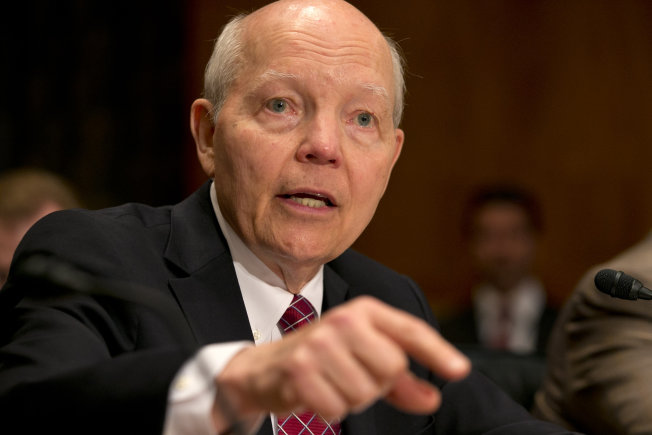House Oversight and Government Reform Committee Chairman Jason Chaffetz began the impeachment process against IRS Commissioner John Koskinen on Tuesday, accusing him of misleading the public and destroying documents that were sought under a congressional subpoena.
It was the latest move in the battle over the targeting of tea party groups at the tax agency.
Less than a week earlier, the Justice Department issued a report finding no criminal behavior in the decision by top IRS officials to subject conservative groups to intrusive scrutiny.
Among the specific charges leveled by Mr. Chaffetz and 18 of his fellow Republicans on the committee were that Mr. Koskinen, appointed by President Obama in December 2013 after the targeting scandal broke, misled Congress when he said he had turned over all of former IRS senior executive Lois G. Lerner’s emails and that he oversaw destruction of evidence when his agency got rid of backup tapes that contained the emails.
It was unclear how far the resolution would go in a Congress preoccupied with so many other fights and with little more than a year to go in President Obama’s tenure.
The impeachment resolution says the IRS knew as early as February 2014 that Ms. Lerner’s messages were missing as the result of a reported computer hard drive crash, but the agency didn’t notify Congress until June and the backup tapes were destroyed in March.
Rep. Elijah E. Cummings of Maryland, the ranking Democrat on the oversight committee, said the accusations against Mr. Koskinen were baseless and the impeachment drive was a waste of time and taxpayer money.
“This ridiculous resolution will demonstrate nothing but the Republican obsession with diving into investigative rabbit holes that waste tens of millions of taxpayer dollars while having absolutely no positive impact on a single American,” the Maryland Democrat said. “Calling this resolution a ‘stunt’ or a ‘joke’ would be insulting to stunts and jokes.”
The IRS released a brief, unsigned statement: “The IRS vigorously disputes the allegations in the resolution. We have fully cooperated with all of the investigations.”
Hours before the impeachment resolution was introduced, Mr. Koskinen told a Senate hearing that he has taken steps to try to clean up the mess left by the targeting scandal.
“The chain of command all the way down has changed. There are new people that have gone through, and we’ve pursued appropriate disciplinary review as needed,” Mr. Koskinen said.
He also acknowledged that his agency is still holding up a “handful” of tea party groups’ applications for nonprofit status, including one that has been waiting for nearly six years, The Washington Times reported this week.
He also said he hopes to have rules to limit political activities of nonprofit organizations in place before the general election next year, raising the specter of another major fight over the tax agency and political targeting.
Mr. Koskinen took over at the IRS after the May 2013 revelation that agency employees singled tea party and conservative groups out for special scrutiny, asking intrusive questions and delaying their applications for nonprofit status well beyond reasonable times. Ms. Lerner took administrative leave that month and resigned her post four months later.
The Obama administration said part of the problem was that the rules were too confusing, leaving the nonprofit groups and IRS auditors uncertain about what activity was allowed.
The IRS has tried a rewrite of those rules that would have prohibited nonprofit groups from conducting voter registration drives or hosting candidate forums. Overwhelming public opposition forced Mr. Koskinen to abandon that proposal, but he said Tuesday that he would try again.
“We would hope that we’d be able to provide these proposed new rules early enough next year so that they could — the work on them can be completed well in advance of the election so there wouldn’t be any confusion,” he said. “But I would stress that the work that we’re doing now is focused on clarifying — not changing — but clarifying the rules under which organizations operate.”
Finance Committee Chairman Orrin G. Hatch, Utah Republican, told Mr. Koskinen that seemed like a waste of time and money when the IRS is already struggling to handle taxpayers’ phone calls during filing season and losing billions of dollars a year to tax fraud.
Mr. Hatch said he would push to impose more restrictions on IRS employees engaging in political activities outside of work. He also said he would try to dent the influence of the labor union representing IRS employees, which the senator suspected of helping feed the tea party targeting.
“Our overall goal here should be to restore the credibility of the IRS and ensure that this very powerful agency treats all American taxpayers fairly,” Mr. Hatch said.
He and other senators were critical of the IRS decision to award bonuses to some of the officials involved in “bad decisions” that led to the targeting.
“The targeting scandal, coupled with poor customer service and general mismanagement, has shaken what confidence taxpayers had in the IRS,” said Sen. Chuck Grassley, Iowa Republican. “To move beyond this, Congress and the IRS are going to have to work together to make the necessary changes to ensure similar abuses can never happen again.”
Source: Stephen Dinan, http://www.washingtontimes.com
 Listen Online
Listen Online Watch Online
Watch Online Find a Station in Your Area
Find a Station in Your Area








 Listen Now
Listen Now Watch Online
Watch Online
